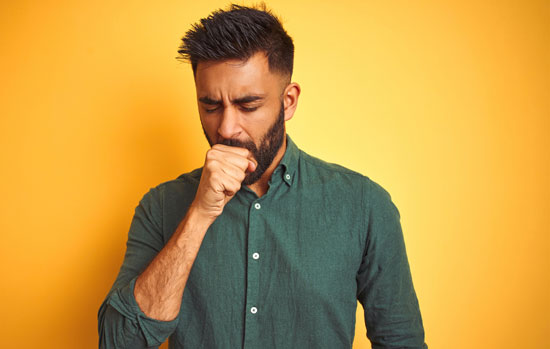
Shortness of breath is one of the symptoms of COVID-19. You may wonder when "shortness of breath" is serious enough to go to the hospital. Find out the medical definition of shortness of breath and what to do if you have it.
Trouble breathing while resting
First, what is shortness of breath?
Shortness of breath means you're consciously thinking about breathing, even while you're at rest. If you can't breathe properly while sitting or lying down, call 911 immediately.
Normally, breathing is something we do without thinking. Without any conscious thought, breathing keeps us alive. We naturally breathe slower when we're asleep and faster when we're exercising. So if you're panting after an uphill bike ride or walking up some stairs, that's normal. If you're breathing harder after intense physical activity (and you are able to catch your breath afterwards), a doctor wouldn't consider that "shortness of breath" medically significant.
Medically speaking, "shortness of breath" means a patient has to actually think about breathing.
Shortness of breath feels different for different people
Different people have different experiences with COVID-19. Some people don't have issues breathing, while others do. Shortness of breath can lead to a very severe case of COVID-19 that requires invasive ventilation. So it's important to get help quickly if you relate to any of these:
- Can't fill your lungs with air
- Needing to pant
- Can't hold your breath
- Every inhale makes you cough
- Feels like you are suffocating
- Chest tightness or pain with breathing
Watch for red flags, which require immediate care
These red flags require immediate medical care. Call 911 immediately if you have shortness of breath associated with:
- Persistent pain or pressure in the chest
- Mental confusion
- Bluish lips or face
COVID-19 affects your lungs
The coronavirus attacks your lungs, which causes shortness of breath.
When you're healthy, you have little construction cells that make a helpful coating for your lung cells. The helpful coating helps your lung cells give you oxygen. Without the coating, your lungs have to work much harder than normal to keep you alive.
The coronavirus kills the little construction cells that make the coating. A person with COVID-19 can't get enough air, because their lung cells are missing their helpful coating. That's why COVID-19 patients are experiencing shortness of breath.
If you don't have asthma, an inhaler won't help
Asthma and COVID-19 shortness of breath aren't the same. Asthma affects your airways (which bring air to the lung tissue), while COVID-19 affects your lung tissue itself. Inhalers help people with asthma by opening up their airways. An inhaler won't help your lung tissue work better.
Essential Oils are not a cure for COVID-19
No evidence suggests that essential oils can treat shortness of breath. Shortness of breath, whether caused by COVID-19 or something else, affects your lung tissues. There's some evidence that diffusing essential oils like eucalyptus might help clear up congestion in your nose – not your lungs.
Keep in mind that essential oils are not a medical treatment and can't replace expert medical care – use them with your health care provider's knowledge and supervision. Avoid putting undiluted essential oils directly on your face, especially your nose. If you're experiencing any issues, call your local health care provider.
Help is a phone call away
Trouble breathing can be caused by COVID-19, asthma, stroke, anxiety, pneumonia and many other conditions. If you're experiencing trouble breathing for any reason, seek medical care quickly.
If it hurts to breathe or you feel like you're not getting enough air while resting, call 911.




